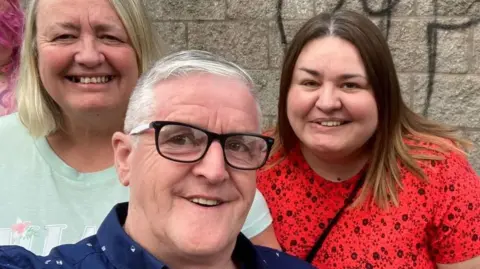'I can't say what my face will do in two hours'
 Amy Green
Amy GreenWhen Amy Green first saw Tulisa Contostavlos on I’m a Celebrity Get Me Out of Here, she said it was “like looking at a mirror image” of herself.
Though the two women look different, they have both suffered from Bell’s palsy, a condition which affects approximately one in 70 people in the UK at some point in their lifetime
Amy quickly recognised how Bell’s palsy had affected Tulisa's face, saying "there's volume that lacks in her face, which is very similar to mine".
Amy, 42, said she welcomed the star's appearances on prime-time TV as it would help raise awareness.
“You can't get a bigger platform than I'm a Celebrity to talk about things, so it's wonderful she's in there," she said.
Tulisa, 36, first spoke about having Bell's palsy on Olivia Atwood’s So Wrong It's Right podcast, during which she said her initial attack had happened when she was 24.
She explained she was given steroid injections and left with swelling before her face dropped and remained drooped for seven months, during which time she said she hid in her house. She added she had since undergone a series of surgeries to balance her face.
However, appearing on the current series of I'm a Celebrity, Tulisa has received criticism about her appearance from some viewers, prompting broadcaster Rylan Clark to urge people on X not to "make jokes about her".
 ITV
ITVFor Amy, from Leeds, the condition hit seven years ago after a stressful period at work.
“I was exceptionally busy. I was doing 60-plus hours a week and I had a second job. Something had to give - and it was me," she explained.
She said she first noticed something was wrong while at the hairdresser one day.
"I remember looking at myself in the mirror and thinking I didn't feel like I was there. I'd felt a little unwell in the run-up to it. I'd had like headaches and pain.
"I’d gone to bed on the Sunday night thinking I just needed some rest. Then I woke up with a really droopy face and my eyes sort of wide open.
"It got progressively worse throughout the day, so my face dropped a lot more. My speech started to be slurred."
Amy said her doctor soon diagnosed her with Bell's palsy.
It took her more than 18 months to recover, and she said that even seven years later there were still areas of her face she cannot move.
“I think I was one of the unlucky ones. It doesn't always take as long to recover for many people," she said.
“Sometimes I could go to bed and it looked one way, and then I'd wake up and it looked a completely different way the next day.”
 Amy Green
Amy GreenAccording to the NHS, Bell's palsy is a condition causing temporary weakness or paralysis of the muscles in one side of the face, with symptoms varying from person to person.
The weakness on one side of the face can be described as either a partial palsy, a mild muscle weakness, or a complete palsy, which is no movement at all.
It can also affect the eyelid and mouth, making it difficult to close and open them.
Amy said that while she understands why Tulisa chose to undergo several bouts of surgery to deal with the effects of Bell's palsy, she had decided against them.
“I was offered Botox, but I decided not to take it because I don't think it's the right thing.
"You're trying to match your other side all the time and I can't tell you what this side of my face is going to do in two hours, let alone in two days.
“So, I chose physical therapy to try and loosen up this side of my face and try to encourage it to come back with stretches.”
Amy said the experience of having Bell's palsy had changed her life in many ways: she cannot drink unless it is through a straw; she has to be more careful about getting rest; and she said eating fast food can be a challenge.
"One time I was trying to go to McDonald's with nieces and nephews," she said.
"I tried to eat something there and I had to bring my own cutlery so I could kind of cut it up and, like, eat a burger.
"But food was never going to stop me. I'm far too much of a foodie."
'Stronger person'
Amy said she was lucky to have a big support network - including help from charity Facial Palsy UK - but colleagues and strangers have not always been so kind and, like Tulisa, she has also experienced negative feedback after going on TV.
"I appeared on TV during the election a couple of years ago. Every single time I go on TV, you can guarantee somebody says something about my face," she said.
"And I just think sometimes it's quite cruel, isn't it, that people think they can have that conversation?"
However, Amy said she thinks having Bell's palsy had made her a stronger person.
"I think it's made me more empathetic. It's opened up my eyes, pun intended, to understand disabilities for other people."
Amy said when "everything kind of fell apart", she had decisions to make - and she concluded: "I can help and I make that a bit better for others."
"You know, I'll wallow for a while and then pull my big girl socks up and get on with it," she explained.
"So, yeah, it's been tough, but it certainly could have been worse."
Meanwhile, Amy said she can only praise Tulisa for going on I'm a Celebrity and raising awareness about a condition which affects so many people.
"It's kind of really nice to have that," she said.
"I think it's just good they give a platform to things like that. I wish her all the best."
Clarification 12 December 2024: A line in this article has been amended to make clear the rate of people affected by Bell's palsy in their lifetime.
Listen to highlights from West Yorkshire on BBC Sounds, catch up with the latest episode of Look North or tell us a story you think we should be covering here.
